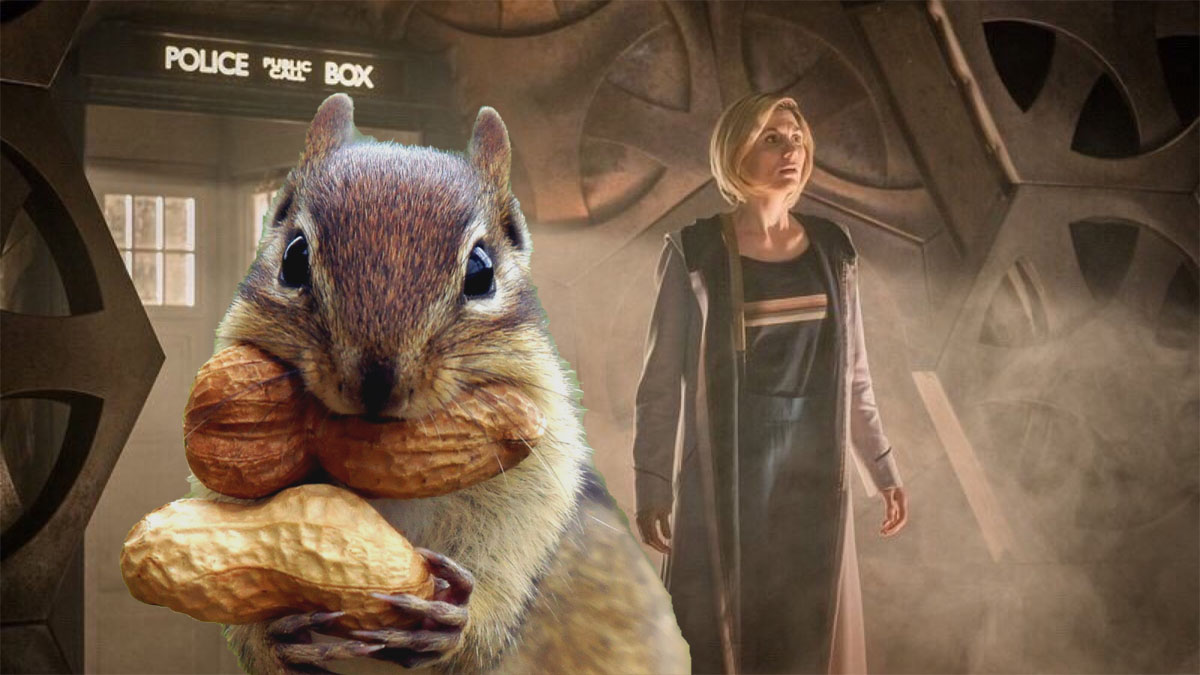Doctor Who series 12 episode 6 review: Praxeus
Team TARDIS divide and conquer to solve this week’s global Doctor Who dilemma. Spoilers after the squirrel…
This review contains spoilers.
Let’s get it out there right off the bat: tonight’s episode Praxeus may follow on directly from the final moments of last week’s Fugitive of the Judoon, but it’s in no hurry to answer any of the game-changing questions we were left with. This is a fairly self-contained story, although it’s not completely divorced from what we’ve been watching the past few weeks, as it makes heavy use of a number of narrative and stylistic choices from other episodes this series.
Part of this can be attributed to returning director Jamie Stone, who was behind the camera for the first part of Spyfall, and in many ways the opening act of Praxeus feels remarkably similar, right down to the same chunky-fonted captions establishing where in the world the Doctor’s companions have been deployed. These consistent elements help this series seem more like one big adventure even when the narratives are totally different, and lend Doctor Who a coherent tone that often went missing during Steven Moffat’s tumultuous production run.
Read more: How Fugitive Of The Judoon echoes a 35-year-old fan theory.
Unfortunately, a few of the show’s recent bad habits have also left their mark on this week’s script, which suggests that they’re going to continue to niggle until the series finale in March. There are a lot of new characters introduced this week, for example, but only two of them get any serious development and two are downright disposable. Three companions are in attendance, but one spends most of the episode benched. All in all, this is very much back to business as usual for Chris Chibnall and the team, so your mileage this week will probably vary based on how invested you are in Team TARDIS’s adventures thus far.
Let’s nudge Daphne aside and take a closer look…

Praxeus begins by introducing multiple players both around and above the globe – an astronaut in a malfunctioning shuttle, a suspended police officer, a pair of video bloggers – and the strange circumstances that they’re embroiled in before they run into the Doctor’s companions, each of whom has been sent to explore one piece of a larger mystery involving alien energy signals.
Splitting up the companions and giving them each a role to play in a larger story has always been when they’re most likely to shine – it worked well enough in Pete McTighe’s inaugural Doctor Who outing, Kerblam! after all. First we see Ryan, whose encounter with an initially-suspicious travel blogger almost immediately turns flirty after she gives him an extensive pat-down – perhaps it’s residual energy from meeting Captain Jack, but Ryan’s time alongside Gabriela is mercifully far less awkward than the thumb-sucking scenes of Orphan-55.
Gabriela’s own companion has gone missing overnight, but with the help of Reddit (yes, really) the pair are able to track Jamila down, only to find it’s far too late to save her. The Praxeus infection may not be the most visually exciting mutation Doctor Who has ever managed – at first I was convinced the shards of plastic were teeth and people were being transformed into Stenza – but the scene where Jamila’s eyes roll back and she begins bucking and writhing on the operating table before literally shattering is one of the grimmest nu-Who deaths in recent memory.
Next it’s over to Graham and Yaz on the trail of missing astronaut Adam Lang, accompanied by his husband Jake, who initially steals the spotlight by doing all of the action-cop stuff. (Is Yaz incapable of kicking a door open? She can punt a P’Ting down a hallway well enough, after all.) D.C. Khan recovers well enough, though, and once again ruins Ryan’s budding romance by recruiting Gabriela to be her sidekick and running off into harm’s way.
Let’s take a moment to talk about Yaz, because this episode gives her a number of long-overdue character moments that point to some interesting developments down the line. Out of the three companions, Yaz seems determined to set herself up as the Doctor’s apprentice, perhaps even her equal. Ryan and Graham rarely challenge the Doctor so directly as Yaz does in this episode, insisting that her plan was worthwhile even when it put her and Gabriela in danger and refusing to let accusations of recklessness from the others dampen her enthusiasm. The Thirteenth Doctor spends far less time interacting with her companions on an interpersonal level and more time using them as a sounding board than previous regenerations did, so it’s fun to see the Doctor stopping to lock horns with an unruly disciple.
Conversely, when the Doctor off-handedly mentions handing out gold stars near the episode’s end, it’s Yaz who responds with a genuinely enthusiastic “Yes!” under her breath. It’s looking very much like Yasmin Khan, while a bit of a Time Lord Try-Hard right now, is actively seeking to emulate and even go toe-to-toe with the Doctor rather than simply enjoying the ride across the universe. We’re unlikely to see Yaz flying an American diner through time and space any time soon, but it’s nice to understand something about what’s motivating her to stay inside the TARDIS beyond curiosity.
Graham gets much less to do this week, but it’s worth mentioning one scene where he gives Jake a pep-talk out on a gorgeous beach, discussing his troubled relationship with Adam. “Can you imagine what it’s like to be married to someone that impressive?” Jake asks. Graham doesn’t respond, never mentions Grace by name, but the sad little smile Bradley Walsh offers up instead speaks volumes. Like Donna and Wilf before him, Graham is proof positive that older, wearier characters have their place in the TARDIS too.
Speaking of the TARDIS, it felt slightly odd that the Doctor would transplant the dying Adam from the interior of what previous regenerations have described as “the best ship in the universe” into a present-day laboratory, as if that was going to somehow up his chances of survival. This is mostly done out of narrative convenience rather than common sense, and leads to us learning the truth about Suki Cheng, who’s been kept largely in the background up until now. Frankly, after last week’s episode I was half-expecting her to secretly be the Rani. Or another regeneration of the Doctor. Or Frobisher.
After Suki teleports away (it’s interesting that every episode so far this year has featured some kind of teleportation technology) we learn that Praxeus was bought to Earth because it attacks microplastics in the blood of living things – and that’s bad news for humanity, because we’ve been merrily polluting the planet’s drinking water with our plastic waste for years. At this point I cringed in anticipation of another Doctor-to-camera monologue, but fortunately the show is less heavy-handed getting this week’s message across than Orphan-55 was. I for one never want the Doctor Who to stop using science-fiction as a lens to examine real-world issues past and present, but right now each week is a coin toss as to whether the episode will manage to do so gracefully or not.
Read more: Doctor Who and the real monsters of series 10
Regardless, this week’s story loses momentum towards the end as Team TARDIS reunite under the Indian Ocean and the Doctor explains the nature of the plastic ‘gyre’ where Suki’s spaceship is parked. Since Praxeus isn’t a villain in the traditional sense, there’s no opportunity for a final confrontation or offering the virus a chance to surrender. All that remains is for the Doctor to develop and deploy an antibiotic capable of destroying it. This being modern-day Earth, there’s never any question that she’s going to succeed, even if her plan does require a heroic sacrifice from Jake – well, nearly. It would have been easy, but also very trite, to kill Jake off for real for the sake of a gloomy ending, so it’s good to see McTighe take the higher path here.
Sleuthing episodes of Doctor Who can be great fun, but as with all mysteries, they live or die based on how satisfying the solution turns out to be and whether all of the puzzle pieces get used well. The resolution to the central mystery of Praxeus lacks a real “ah-ha” lightbulb moment; that point in the story where you suddenly realise how everything is all connected. A lot of the clues turn out to be… well, not red herrings exactly, but entirely incidental.
Take the missing submarine – initially, it’s presented as being a key part of unravelling the mystery, and potentially every bit as significant as Ryan’s dead bird or the alien laboratory in Hong Kong. By the end of the episode, it’s just sort of… there, buried in the scenery after been downed by the same energy pulse that damaged Lang’s space shuttle. It’s a consequence of the conspiracy, rather than part of the key to understanding it. The truth behind Praxeus isn’t really rich enough to link everything together in meaningful ways, even though the episode’s opening monologue assures us that it’s all connected.
If there is such a thing as a ‘template’ for an episode of Doctor Who under Chris Chibnall’s watch, we’re seeing it in action this week. We have varied location shoots, the threat of a worldwide conspiracy, great production values and some excellent character moments – but there’s also some really thankless exposition from the Doctor, especially near the end of the episode. Praxeus may span the planet, but the idea at the heart of this week’s story isn’t quite big enough to support the ambitious mystery it’s trying to weave, leaving us with an episode that’s decent but far from spectacular. Then again, Fugitive Of The Judoon always was going to be a tough act to follow…
Read Chris’ review of the previous episode, Fugitive Of The Judoon, here.
